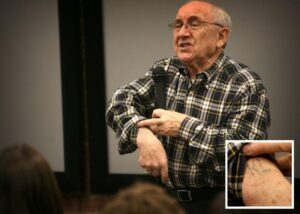By Nancy George
Holocaust survivor Max Glauben will receive an honorary Doctor of Humane Letters from SMU at its August 15 Commencement ceremony. Glauben is recognized across Texas and the nation as a passionate advocate for Holocaust and human rights education, and the embodiment of human hope, resilience and optimism.

In December 2019, Glauben was named “Texan of the Year” by The Dallas Morning News for his unceasing calls to resist hate, stand up for others and strive for peace.
“This year is the 75th anniversary of the end of World War II,” says Rick Halperin, director of SMU’s Department of Human Rights. “And Dallas last fall opened the first museum dedicated to educating about human rights through the lens of the history of the Holocaust. This is the perfect time to recognize Max Glauben for his unwavering commitment to educate generations of students about the Holocaust and for his leadership in the creation of the museum.”
Glauben is the only member of his family to survive the Holocaust and has for decades shared his story with students and adults around the world. Glauben has returned 14 times to guide a group of youth on a tour of Holocaust sites in Europe—a program called the March of the Living—including the spot where his family members perished. He has made eight trips to speak at Flossenburg concentration camp, where he was once held as a concentration camp prisoner.
Glauben was among the group of Holocaust survivors to found the movement that led to the creation of Dallas Holocaust and Human Rights Museum, which opened in September 2019. The museum began as a modest display in the basement of the Dallas Jewish Community Center. The original Dallas Memorial Center for Holocaust Studies opened in 1984. Glauben and his wife, Frieda, both served on the first board of directors. He would later serve as chairman of the center’s board.
Glauben was born in Warsaw, Poland, in 1928. During the Warsaw Ghetto uprising in 1943, his family hid with other families in an underground shelter. After being reported by an informant, Nazi soldiers extracted them and deported them in boxcars to the Majdanek Extermination Camp in Lublin, Poland.
When they arrived, Glauben was separated from his mother and little brother who, tragically, were selected for extermination in the gas chamber. Glauben and his father were transferred with other Jewish prisoners to the Budzyn labor camp—a satellite of Majdanek. They worked as slave laborers in an airplane factory until Glauben’s father was murdered in reprisal for three prisoners that the guards mistakenly believed had escaped.
In the years that followed, Glauben was a prisoner at three more camps: Mielec, Wieliczka and Flossenburg. After a final transfer to the Flossenburg concentration camp, he was ordered on a death march to Dachau concentration camp. Before the prisoners reached Dachau, however, they were rescued by American soldiers. Glauben was just 17.
After liberation, Glauben was rescued by members of the U.S. Army’s 179th Signal Repair Corps Company, with whom he spent the next two years in Nuremberg, Germany. In 1947, he immigrated to the United States. After he turned 18, he registered for the draft in the U.S. He served in the Army for five years, including during the Korean War, and attained the rank of staff sergeant. As soon as his active duty ended, he moved to Dallas and proposed to Frieda. They were married June 14, 1953 and this year they celebrate their 67th anniversary.
At age 92, Max is still a frequent speaker at the Dallas Holocaust and Human Rights Museum. He travels across Texas and the world to speak to students about his experiences, providing insight and life lessons that have inspired generations.
